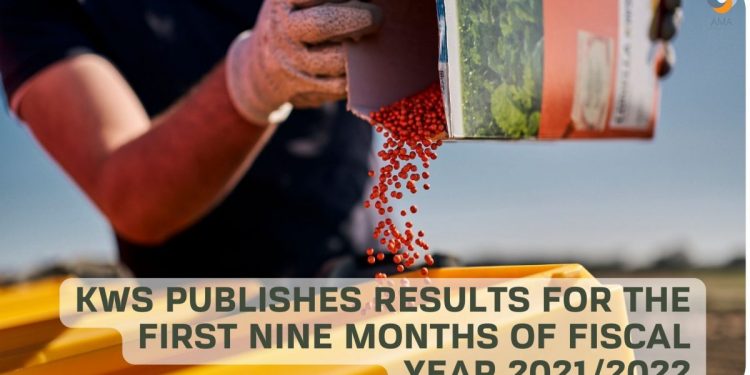Significant increase in net sales – Results at previous year’s level despite considerable headwind – Net sales forecast raised
The KWS Group (ISIN: DE0007074007) increased its sales by around 13% in the first nine months of fiscal 2021/2022. The key figures EBITDA, EBIT and the result for the period reached the level of the previous year.
“Our figures for the first nine months of 2021/2022 are reflecting the current agricultural environment,” commented Eva Kienle, CFO of KWS. “Due to the sharp rise in prices for agricultural products, we are seeing high demand for seeds on the one hand, and on the other hand we are faced with significant cost increases. In addition, the effects of the war in Ukraine are having a negative impact on our earnings. Despite these challenges, we managed to keep our results stable.”
Sales rose by 13.3% to €1,213.7 (1,071.3) million in the reporting period. Overall, currency effects only had a minor impact on sales. The key earnings figures EBIT, EBITDA and the result for the period were at the previous year’s level despite negative factors (see table below). In addition to significant cost increases and the effects of the Ukraine war, the strong devaluation of the Turkish lira had a negative impact on the operating result.
At € –84.0 (–27.6) million, free cash flow was below the previous year’s figure due to the increase in working capital. Both trade receivables and inventories rose significantly due to the growth of the KWS Group.
In view of the business performance in the first nine months, the Executive Board is updating its guidance for the 2021/2022 financial year. KWS now assumes that its net sales will grow by approximately 10% (previously: 6% to 8%). A better than expected sowing season in the Ukraine contributes to this. The Executive Board underscores its high recognition of the work of the Ukrainian employees of KWS, who delivered a large part of the seed to farmers with great commitment and under the most difficult conditions, thus making an important contribution to the country’s future food supply.
An EBIT margin of 8% to 9% is still anticipated. The segment forecasts for corn and vegetables were adjusted against the background of the current business performance.
Overview of key figures
| in € millions | 9M 2021/2022 | 9M 2020/2021 | +/- | |
| Net sales | 1,213.7 | 1,071.3 | 13.3 % | |
| EBITDA | 254.0 | 260.4 | -2.5 % | |
| EBIT | 185.9 | 193.4 | -3.9 % | |
| Net financial income/expenses | -0.8 | -7.6 | 89.5 % | |
| Result of ordinary activities | 185.2 | 185.8 | -0,3 % | |
| Income taxes | 50.0 | 49.6 | 0.8 % | |
| Net income | 135.2 | 136.2 | -0.7 % | |
| Earnings per share | in € | 4.10 | 4.13 | -0.7 % |
Business performance of the segments
The Corn Segment posted a significant increase in net sales of 20% to €723.2 (602.7) million in the first nine months. The South American markets Brazil and Argentina, in which business expanded strongly, made a major contribution to that. Growth of approximately 5% was achieved in our European markets. In a challenging environment for corn seeds, the net sales of the U.S. joint venture AgReliant rose by 11% on the back of higher sales volumes for soybean seed and favorable exchange rate effects. A strong increase in the cost of sales, expansion of the business in Brazil, and negative impacts from the war in Ukraine weighed on the segment’s income, which fell to €72.6 (77.7) million.
Net sales in the Sugarbeet Segment in the first nine months rose by 4% to €441.4 (425.4) million. That was due in particular to strong growth in France, Eastern Europe and North Africa. The segment’s net sales were buoyed by the market success of the CONVISO® SMART variety portfolios and newly launched Cercospora-tolerant varieties (CR+). Further major contributions to net sales in the U.S. and Europe are expected in the remaining fourth quarter. The segment’s income was €162.4 million, on a par with the previous year’s figure of €164.3 million. The devaluation of the Turkish lira also had a significant negative impact on earnings.
Net sales in the Cereals Segment in the first nine months rose to €200.2 (176.9) million, mainly due to strong growth in rapeseed seed. That business was boosted in particular by favorable market conditions and an improved performance of the variety portfolio. While net sales from rye and wheat seed likewise increased, revenue from barley seed was at the level of the previous year. In addition, business with sorghum seed in Brazil was very pleasing. The segment’s income rose to €53.5 (44.4) million on the back of the growth in net sales and an improved product mix.
Net sales at the Vegetables Segment fell to €34.5 (38.5) million, in particular due to high inventories at distributors and intensified competition. In the period under review, KWS laid the foundation for future growth by expanding its breeding activities significantly. That includes the acquisition of land in Spain and the establishment of local breeding teams. As a result of the course of business and the build-up of the Business Unit Vegetables, the segment’s income fell to € –15.3 (–13.0) million. Excluding effects from the purchase price allocation as part of company acquisitions, the segment’s income declined to € –0.6 (6.6) million.
Net sales in the Corporate Segment totaled €7.2 (5.4) million. They are mainly generated from KWS farms. Since all cross-segment costs for the KWS Group’s central functions and research expenditure are charged to the Corporate Segment, its income is usually negative. The segment’s income fell slightly to € –77.8 (€ –75.4) million.







